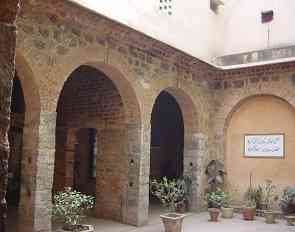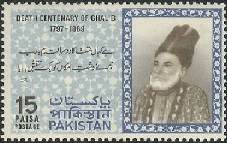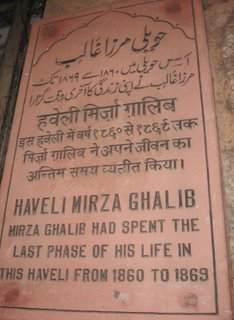Adnan Ahmad
hoi muddat ke Ghalib mar gaya par yaad aataa hai
woh har ek baat pe kehna ke yooN hota to kia hota

One such person is Mirza Asadullah Khan Ghalib. Given his towering and well-known stature, instead of writing purely a biographic piece I will be short and mention a few of his verses and a few of the highlights of this wizard’s life.
Ghalib’s portrait to the right is from urdustan.com
Through earlier years of my life the name Mirza Ghalib invoked a stereotypical image in my mind about yet another old poet from the subcontinent writing on the classical subjects of romance and appearing thoroughly outdated in my world.
That was until I came across Gulzar‘s serial Mirza Ghalib and found outsides of Ghalib and meanings of his verses that I had not known before.
Here is a sample:
![]()
 The year was 1990 and someone in our family had gained access to the tapes that were not available in the market yet. Over the course of next few years of my high school I watched the serial over and over again, read his poetry and about his life, with each attempt increasing my fascination with the poet and his poetry. Photo to the left is the ‘haveli’ where Ghalib lived.
The year was 1990 and someone in our family had gained access to the tapes that were not available in the market yet. Over the course of next few years of my high school I watched the serial over and over again, read his poetry and about his life, with each attempt increasing my fascination with the poet and his poetry. Photo to the left is the ‘haveli’ where Ghalib lived.
And there are still days when I find new meanings in his verses I had heard and known for ages. 
Image to the right is a postal stamp issued by Government of Pakistan in commemoration of Mirza Ghalib
This is the collection of poems about which a famous Urdu critic from the 19th century, Abdul Rehman Bijnori, once said that there are two books sent from the heaven to the sub-continent, one is Holy Geeta (muqqaddas Vaids) and the other is deewan-e-Ghalib. Still it baffles me to think how a 25-year old can express such mature sorrow in a verse like:
ghar meiN tha kia ke tera gham osay ghaarat karta
woh jo rakhtay the hum ik hasrat-e-taameer so hai
And another verse which goes like this:
hoa jab gham se yooN be-hiss to gham kia sar ke kaTnay ka
na hotaa gar juda tan se to zaanoo par dharaa hota

Photo to the right is a plaque at mazar-i-Ghalib
I think whatever he claimed for himself was an understatement. Many including myself, do consider him a philosopher, a great scholar and even a wali (saint) of his time. And on that tangent, I don’t think I’ve heard a better elaboration of tawheed (oneness of God) than his verse:
hum muwwahid haiN hamara kashe hai tark-e-rusoom
millateN jab miT gayeeN, ajzaa-i-imaaN ho gayeeN
In anoher instance he accepts God in a way few of us can:
jaaN dee, dee hoi osee kee thee
haq to ye hai ke haq adaa na hoa
Finally, a verse that stays with me all the time and unfolds itself in new ways each time I think about it.
hai kahaaN tammanna ka doosra qadam ya-rabb
hum ne dasht-e-imkaaN ko ek naqsh-e-paa paaya
Then, there is of course the letters Ghalib wrote. Here is a wonderful sample read by Zia Mohiuddin.
Recommended Website on Ghalib:
(1) There is a very good biography of Ghalib present at a webpage here.
(2) Best of Ghalib



















































Mr. Adnan Ahmad: Your points are well taken, and you can see how many well-selected and ‘maa’Nay-khez’ verses of Ghalib have enriched this post.
Mr. Mazhar Butt’s quote above reinforces MQ’s comment about the many layers of meaning which as he describes them are like an onion bulb one can continue to peel and reflect upon. This analogy brought to my mind Iqbal’s verse:
“Tar aankhain to ho jati hain par kya lazzat oos ronay mein
Jab khoon e jigar ki aamaizash say ashk piyazzi ban na saka”.
The last two comments were about wine; Ghalib has written so often and in such a variety of ways about it. (Of course there is also the sharab e tahoor) Here are two verses of the worldly kind:-
“Mai say gharaz nishat hai kis ru-siyah ko
Aik goona bekhudi hamain din raat chaa’eyay.”
“Ghalib chhuti sharab par ab bhi kabbhi kabbhi
Peeta hoon roz e abr o shabey mahtab mein.”
One can write dissertations on so many of his verses as Mr. Adnan Ahmad so rightly says above.
MQ and Ahmed2, By way of discourse, as I wrote to Adil before sending this post, part of the intent of writing this post was to focus on Ghalib that he was claiming to be a saint because majority of the people who haven’t read him in detail know that he was a badakhwaar, had affairs while being married and was a failure in material achievements. But very few people know his ideas on tauheed, on the limitations of our physical existence and on the entire idea of jaza and saza on which all religions seem to be hung up on. Verses in the post were chosen carefully for that purpose. As you know one could easily start writing a dissertation on some of his verses.
I consider Socrates a prophet of his time. But then there are people who would end the conversation by calling him gay, pretty much like the government of Athens at the time that ended his life.
It’s like this;
Wa iz sharab peeney dey masjid mien beth kar
ya woh jagah bata ke jahan per khuda na ho !
Here is a quip from Ghalib as reported by Hali and quoted and translated by Ralph Russel in his book:
[quote]A man in Ghalib’s presence, strongly condemned wine drinking, and said that the prayers of the wine-bibber are never answered. ‘My freinde’, said Ghalib, if a man has wine, what else does he need to pray for?’[/quote]
Ahmed2, are you there?
Jis ko dekho bana bhateeja hey
duum uthaata hoon jis ki bakri hey !